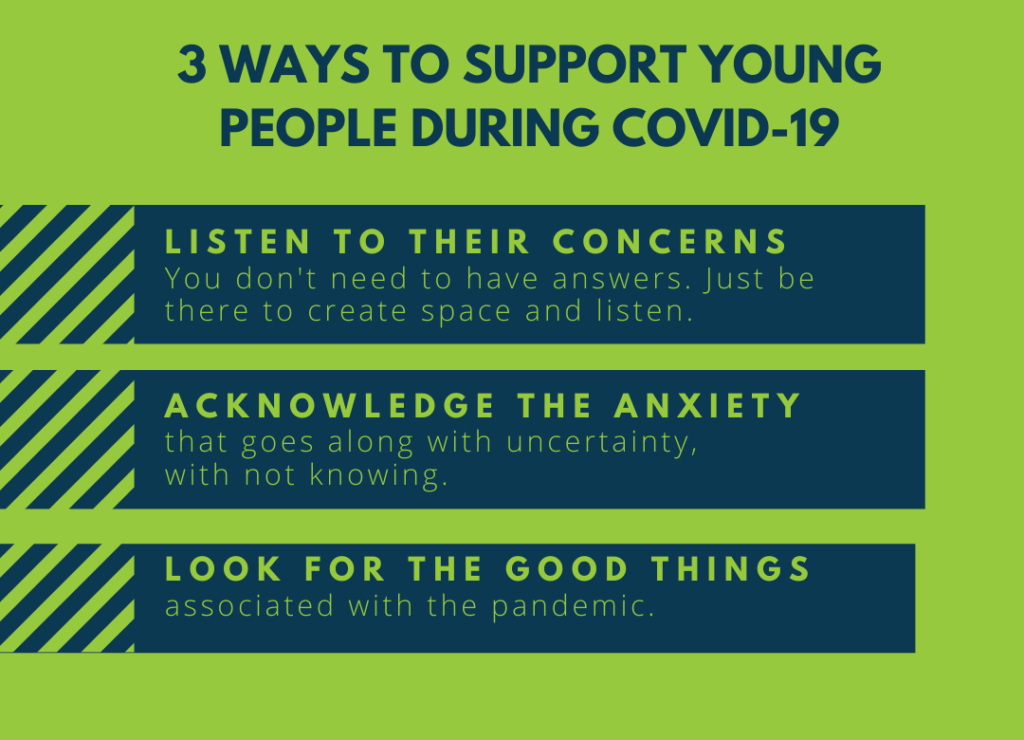ASK THE EXPERT: SUPPORTING MENTAL WELLNESS IN YOUNG PEOPLE
An interview with Dr. Bonnie Carlson-Green, Pediatric Neuropsychologist at Children’s Minnesota.
SteppingStone Theatre for Youth is feeling the anxiety of the unknown alongside our families. The uncertainty surrounding what school may look like this fall, when the pandemic may end, coupled with the usual developmental challenges associated with growing up today has everyone feeling on edge. We talked with Dr. Bonnie Carlson-Green, a Pediatric Neuropsychologist at Children’s MN, to get her advice about how to best support mental wellness for the young people in our lives.
M: How can caregivers support young people during COVID-19?
BCG:
—Listen to their concerns. You don’t need to have answers. Just be there to create space and listen.
—Acknowledge the anxiety that goes along with uncertainty, with not knowing
—Together with your child, look for the good things associated with the pandemic (e.g., maybe your family schedule is less hectic, maybe you’ve learned how to do something new like make sourdough bread, maybe you have been able to get a better idea of how your child is struggling with schoolwork).

M: As a Neuropsychologist, can you talk to us about what is happening in our brains as we all face an uncertain future?
BCG: Anxiety about the unknown, about the changing and conflicting information that is in the media about the virus, not to mention all the changes that have evolved since George Floyd’s death can make it very difficult for our minds to be still and focus. When our emotional brain “hijacks” our thinking brain, it makes it very difficult for us to engage in higher-level cognitive processes like managing our emotions well to consider different options, considering different aspects of a problem, planning ahead, getting started with something new, keeping track of everything we want to keep track of. That is why learning ways to calm ourselves and practicing those strategies every day (even when we are not anxious) can help us remain calmer and more thoughtful and proactive (instead of reactive) under times of stress.
M: What are some easy tactics to calm anxiety right now?
BCG:
— Get enough sleep! This is an important time for everyone’s body to recharge and reboot. It is a simple intervention that is too commonly overlooked, particularly for adolescents. In particular, a consistent sleep schedule with a similar bed time and wake time every day is very important–and doable.
— Get moving! Go for a walk. Find some beautiful parks or shady tree areas or a lake and walk. You don’t need special equipment. You don’t need to go fast. Just move your body every day.
— Meditate! Try mindfulness meditation using apps like Headspace or Calm (the free versions offer limited, but useful access) so you can have someone else guide you. Don’t worry if you are not good at meditating or your mind is full of chattering monkeys. The whole point of “practicing” meditation is not to have an empty mind but to be able to focus your attention where you want it. The practice of bringing your attention and focus back under your control will get easier over time. Have a contest with your family or friends to see who can have the longest streak of daily meditation practice. I love this short video from journalist Dan Harris about how he started meditating after an on-air anxiety attack: It dispels a lot of myths about meditation.
See the cast of Disney’s The Little Mermaid Jr. move and meditate in the video below.
M: Anything else we should know to support the socio-emotional health of young people?
BCG: Know that as parents and caregivers and teachers, you have the opportunity to teach young people strategies and awareness that they will take into adulthood. Young people who learn how to effectively manage their anxiety as youth, will be less likely to suffer from anxiety and depression throughout their lives. It’s the gift that keeps on giving!
Did you know that engaging in theatre programs promotes both movement and mindfulness by the very nature of making art together? Take a closer look at our hybrid, in-person/virtual camps or completely online Virtual Studios designed specifically for these age groups!

Bonnie Carlson-Green PhD, LP, is a Pediatric Neuropsychologist at Children’s Minnesota. She earned her PhD from Georgia State University in Atlanta, completed her internship at Children’s Memorial Medical Center (now Lurie Children’s Hospital) in Chicago, followed by a 2-year fellowship in neuropsychology at the University of Minnesota Medical School. She remained there as a staff pediatric neuropsychologist until joining Children’s in 1996 to develop the neuropsychology program for Hematology Oncology patients. In addition to her work with children with various forms of cancer, she sees a variety of patients with medical, learning and developmental disorders from infancy to young adults and enjoys the opportunity to follow her patients over the course of childhood into adulthood. Dr. Carlson-Green recently published her results of a study of working memory intervention (Cogmed) in brain tumor survivors. Dr. Carlson-Green’s interests include parent advocacy for students with special needs, transition planning, and neurodevelopmental outcomes after childhood cancer and cancer survivor issues. In her spare time, she enjoys reading, travel, Nordic skiing, open water swimming and endurance sport training.